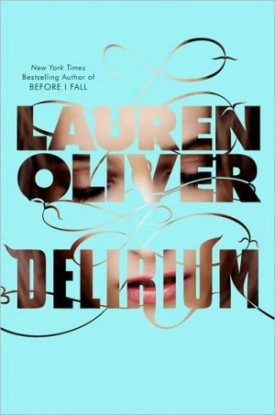Before scientists found the cure, people thought love was a good thing.
But now, everyone knows better. In the not too distant future, amor deliria nervosa has been classified as a disease and the root of all the bad things in the world; war, suffering, violence. Thankfully, a cure has been discovered, the administration of which is mandatory for anyone over the age of 18. Lena Haloway has just graduated high school and only has three months until she can get the procedure; she can hardly wait. She’s seen the havoc the infection can wreak, and she knows the truth; love kills you when you have it and kills you when you don’t. A life without love, on the other hand, is safe. Happy. But when she meets Alex, things start to change. Will she be able to stave off the infection until she can get the cure, or will the unthinkable happen–will Lena fall in love?
I had mixed feelings about this book, so I’ll start off with the things I didn’t love about it. Primarily, I thought the execution of the premise of Delirium was absolute rubbish. In theory, the premise of Delirium is fascinating; future society has classified love as a psychological disorder requiring extreme treatment. Oliver’s execution of the premise, however, leaves something to be desired. She offers the reader zero scientific proof or research behind the demonization of love, nor any biological/chemical/hormonal basis for the disease. She only tells us that Scientists know it’s a disease, and Scientists found a cure using Science. As someone who happens to know that Science isn’t a monolithic organization who know everything and always agree, this premise was silly bordering on laughable.
On the upside, however, Oliver’s portrayal of society post-cure is very well done. The borders of the USA have been closed for nearly a century; Lena, the main character, implies this was done to prevent the spread of the disease from other countries who chose not to mandate the cure. (Canada is for lovers.) Townships are closed off and travel is closely regulated; habitable communities are surrounded by uninhabited forests known as the Wilds. But besides these macro-level changes, day-to-day life is nearly identical to today. People go to work and to school; they get married and have kids; they grocery shop and watch TV. The real changes are small, insidious things that the reader barely notices at first. By making Lena’s world superficially similar to ours, Oliver cleverly draws her readers in and lulls them into a false sense of security; we discover just how wrong society is in tandem with the protagonist, her realizations echoing our own uneasy predictions.
One of my favorite aspects of Delirium also dealt with Oliver’s worldbuilding; at the beginning of each chapter she offers the reader an epigraph from one of several fictional textbooks and handbooks that are circulated in Lena’s world; treatises on the dangers of love; guidelines on how to detect and report symptoms of deliria; quotations from works of literature that have been banned as subversive. For me, this was the kind of subtle touch that sets a book apart; it showed a true knowledge of the fictional universe she had created as well as a dedication to worldbuilding that I wish Oliver had extended to the scientific premise of her whole novel.
Finally, I found Oliver’s writing style to be lush and sensual, perfectly suited to a book that is, at its heart, a love story about falling in love with love. I found myself savoring sentences, rolling them around my tongue and reveling in the rhythm of them. Gorgeous descriptions set the scene, and repeated themes and motifs resonated throughout the text. While I had some complaints about Oliver’s premise, I could not fault her writing.
(Except once: “His eyes are literally dancing with light,” Oliver writes, “burning as though on fire.” No they aren’t. Just no.)

0 Comments